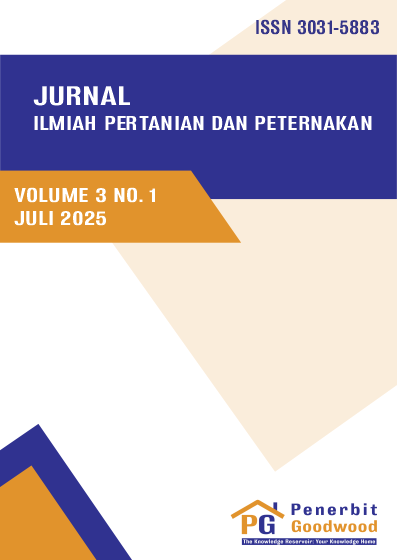Jurnal Ilmiah Pertanian dan Peternakan (Jipper) Is an open-access, peer-reviewed and scholary journal which aims to provide an excellent media for researchers, academicians, and practitioners to express their critical and fresh ideas to promote the theoretical and practical development of agricultural and livestock sectors. Jipper welcomes submissions of empirical research article, review article, case study, report and book review in the fields of agriculture and livestock.
Published
2025-08-21
Purpose: This study aims to analyze the effect of price fluctuations in curly chili on farmers’ income in Lubuk Saung Village, Banyuasin III District, Banyuasin Regency, and to identify the key factors causing such fluctuations. Curly chili is recognized as a strategic horticultural commodity that is prone to high price volatility due to seasonal conditions, market demand, and distribution constraints.
Methodology/approach: Quantitative research with a descriptive approach, using a census of 31 curly chili farmers. Data were analyzed using Exploratory Factor Analysis (EFA) to determine factors causing price fluctuations and Spearman correlation to assess the effect on income.
Results/findings: Key factors influencing price fluctuations are season and weather, production costs, infrastructure, planting patterns, government policies, middlemen, pest and disease attacks, seasonal demand, and community consumption trends. Price fluctuations have a significant effect on farmers’ income.
Conclusions: Curly chili price volatility in Lubuk Saung Village is influenced by environmental, market, and structural factors, and directly impacts farmer livelihoods. Addressing these challenges requires integrated strategies involving government, market actors, and farmers.
Limitations: The study’s scope is limited to one village with a small sample size, potentially reducing generalizability to other regions or commodities.
Contribution: This research contributes empirical evidence on the link between horticultural commodity price volatility and farmer income, offering practical insights for policy design and market stabilization strategies to protect farmer welfare.


 Google Scholar
Google Scholar Garuda
Garuda Sinta
Sinta

